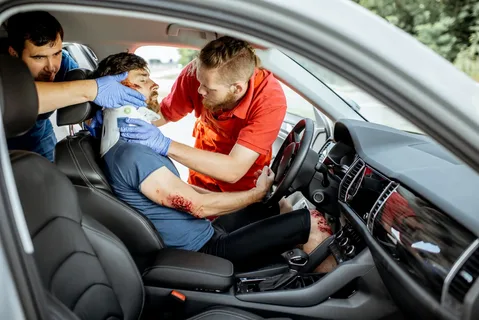Health Insurance Cover Car Accidents When we think about health insurance, most people picture it as a safety net for illnesses or regular doctor visits. However, what happens if you get into a car accident? Does health insurance cover injuries from car accidents? This is a common question, especially for drivers who want to ensure they are fully protected. In this blog post, we’ll explore how health insurance works in car accident situations, what other insurance you may need, and how to make sure you have the right coverage in place
Health Insurance Cover Car Accident Injuries
Health insurance generally covers injuries related to car accidents, but it depends on the specific terms and conditions of your policy. Like any other medical situation, if you are injured in a car accident and need hospital care, surgery, or therapy, your health insurance should step in to cover the cost. However, there are a few caveats to consider:
- Deductibles and Copays: You may still be responsible for your deductible and any copays. Just like with any medical claim, if your policy includes these costs, you will need to pay them before the insurance covers the rest.
- Coverage Limits: Health insurance policies have limits, meaning they only cover up to a certain amount. If your injuries are severe and treatment is expensive, you could reach these limits and be responsible for additional costs.
- Exclusions: Some health insurance plans exclude coverage for accidents if another type of insurance is involved. For instance, if your car insurance includes Medical Payments (MedPay) or Personal Injury Protection (PIP), your health insurer might require those to be used first.
Important Note: Before relying solely on health insurance, it’s essential to review your policy details or contact your insurer to understand the extent of your coverage.
Health Insurance vs. Car Insurance: Who Pays First
A critical question that arises after a car accident is: Who pays first, your health insurance or your car insurance?
The answer depends on the type of auto insurance coverage you have and the laws in your state. Here’s a breakdown of how these different types of coverage work:
1. Personal Injury Protection (PIP)
PIP, often referred to as “no-fault” insurance, is required in certain states and optional in others. This coverage is specifically designed to pay for medical expenses after a car accident, regardless of who is at fault. If you have PIP, it generally takes precedence over your health insurance and covers:
- Medical bills (hospital visits, surgeries, etc.)
- Lost wages
- Other accident-related costs, such as rehabilitation
Why PIP Matters: In states where PIP is mandatory, it will pay for your medical expenses up to the policy limits before your health insurance even comes into play.
2. Medical Payments (MedPay)
MedPay is similar to PIP but typically more limited in scope. MedPay also pays for medical expenses after a car accident, but it doesn’t cover other costs like lost wages. This coverage is optional and not available in all states. Like PIP, MedPay kicks in before your health insurance, ensuring your medical bills are covered immediately after an accident.
MedPay vs. Health Insurance: If you have MedPay, it will cover accident-related injuries up to its policy limits. Once those limits are reached, your health insurance will then take over.
3. Coordination Between Car and Health Insurance
If you don’t have PIP or MedPay, your health insurance will be responsible for paying your medical bills after a car accident. However, it’s important to know that if your car insurance includes coverage for medical bills, like in the case of a third-party liability claim, your health insurer may seek reimbursement from your auto insurance.
What About Out-of-Pocket Costs
While your health insurance may cover a portion of your medical expenses after a car accident, it’s essential to remember that out-of-pocket costs can still occur. These include:
- Deductibles: The amount you must pay before your health insurance kicks in.
- Copayments: Set amounts you pay for services like doctor visits or prescriptions.
- Coinsurance: A percentage of costs you pay after meeting your deductible.
Example Scenario:
Your health insurance plan has a $1,000 deductible, a $50 copay for each doctor’s visit, and a 20% coinsurance rate. The total cost of your treatment is $10,000. Here’s how the costs break down:
- You would pay the first $1,000 (deductible).
- Your health insurance would cover 80% of the remaining $9,000 ($7,200).
- You would be responsible for 20% of the remaining $9,000 ($1,800), plus any additional copays.
Understanding how to file claims with both your car insurance and health insurance providers is crucial for minimizing out-of-pocket costs. Here’s a general process to follow:
- Report the Accident: Immediately notify your auto insurance company about the accident. If another party is at fault, they may cover your medical expenses under their liability insurance.
- Seek Medical Treatment: Make sure you receive the necessary medical treatment, and keep all records and bills.
- Submit a Health Insurance Claim: File a claim with your health insurance provider for any medical expenses related to the accident. Your insurer may coordinate with your auto insurer.
- File a PIP or Med Pay Claim (if applicable): If you have PIP or Med Pay, file a claim with your auto insurance provider to cover your initial medical costs.
Tip: Keep detailed records of all communications with insurance companies, as this can help if you encounter disputes or delays in claims processing.
Special Cases: Does Health Insurance Cover Long-Term Rehabilitation?
In severe accidents, recovery can take months or even years, involving long-term care such as physical therapy, rehabilitation, or surgeries. Health Insurance Cover Car Accidents Does health insurance cover these costs?
The answer is: It depends. While most health insurance policies cover immediate medical treatment after an accident, coverage for long-term care can vary. Some policies may limit the number of covered therapy sessions or have other restrictions. Always check your health plan to understand its rehabilitation coverage.
Conclusion
In conclusion, health insurance does cover car accident injuries, but its role depends heavily on the type of auto insurance you have, your policy limits, and the laws in your state. While health insurance is essential for covering medical expenses, additional coverages like PIP or Med Pay can offer valuable protection and peace of mind after a car accident.
For more information on navigating insurance claims after an accident, you can refer to Insurance Information Institute for further details. Also, if you’re unsure about your coverage, consider reaching out to a licensed insurance agent for personalized advice.
Ensuring you have the right combination of health, auto, and supplemental coverage can make all the difference in minimizing financial stress after an accident.



